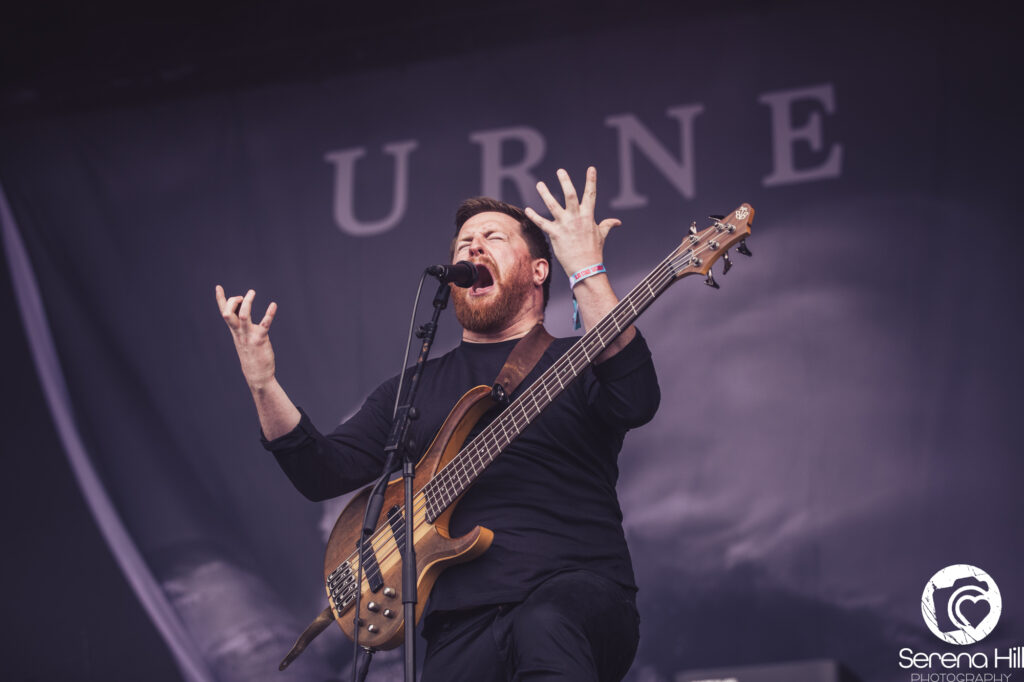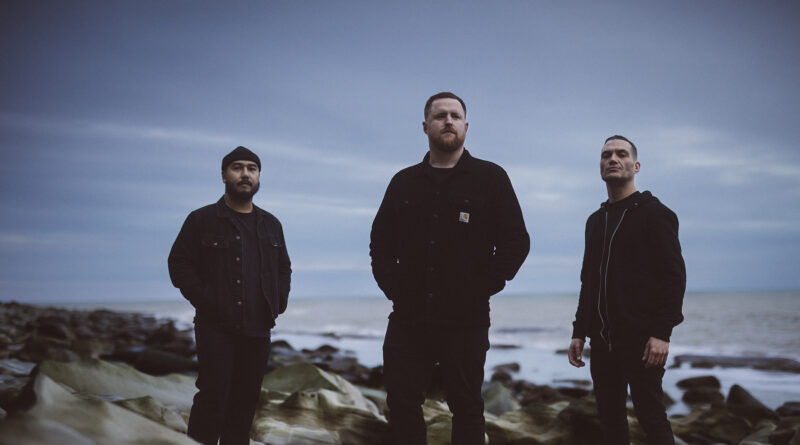Urne: Where Do The Memories Go?
To lose a loved one is to lose a limb; a piece of yourself passes over to patchwork quilts of memories. To watch a loved one fade away, day-by-day, at the hands of dementia, deterioration and disease is an experience language cannot capture. However, for vocalist and bassist Joe Nally of URNE, writing an album about it was the only way to process his feelings.
“Sometimes, like some of the lyrics, I’d go ‘I’ve got this in my head, blah blah blah, I need to get this out, I need to write about it.’ And sometimes it’s bloody hard trying to get out what’s in your head or what you’ve seen or what you’ve heard, trying to get that out sometimes and put it into words is bloody hard,” says Joe, who spends our call craving a beer, keeping his cat Otis out of the vinyl cupboard, and wearing his heart firmly on his sleeve.
A Feast On Sorrow, the follow-up to 2021’s Serpent & Spirit, dispels the ‘difficult second album’ syndrome in seconds. Completed by longtime musical partner and guitarist Angus Neyra and new drummer James Cook, URNE’s latest is a tsunami of experimental, progressive, and post-metal soundscapes that soundtrack the surrendering of one’s soul to the deterioration that comes from long-term illnesses, and the suffering loved one’s face looking on.
Before the tide came in, the band had been on a roll since releasing Serpent & Spirit upon the world right in the middle of Covid-19. They were left feeling a high from a triumphant show at Bloodstock 2021, although Joe looks back on it and thinks he’d “watch that set now and I would probably cringe really bad, like I had three mics set up and it was all mishmash and I didn’t know what I’d do with my bass tone, but it felt good, we had a good crowd response.”
But then the flood came rushing in, and the members of URNE found themselves surfing a wave strong enough to engulf them. “When we started writing this record with our previous drummer, I found out a parent had a sort of terminal illness, our old drummer’s mum had a heart attack, Angus’s mum had something which meant she had to retire, and all of a sudden it was like fucking hell, it really made you take note of everything.”

Suddenly, things had gotten serious. Not just in their personal lives, but in their professional ones, too. Before A Feast On Sorrow could come to fruition, Joe found himself taking stock of their journey so far, driven by the real-life grief he was going through. “My parents got to do what they wanted to do, be it live in Spain or do this as their job, and out of fear, I don’t think I ever fully chased it and all of a sudden, something happens and I’m like, you know what, I’ve got to do this,” he reflects, the constant comprehension of his own thoughts clear on his face. “It’s made me grow up a bit more, become a little more serious, and more driven.”
That drive can be heard in every second, every note, and every moment of A Feast On Sorrow. Driven by not one, but two towering 11-minute monoliths – A Stumble Of Words and The Long Goodbye/Where Do The Memories Go? – the album takes you through the process Joe has been on, a personal testament to the emotional and physical toll death and disease has on us.
“I think the next few years are going to be pretty tough, but it’s developing me as a person, it’s making me a bit stronger,” Joe enthuses, before changing his tone to reflect his reality, adding that “some of it’s just sad mate, it’s sad. We’re gonna have some really sad times, and it can be a lot to deal with, and in my family with what’s happening, I’m slightly the outcast, even though we all moved out of London to live by the seaside, they’re a lot closer than I am so when I drop in and see immediate family relatives, and I see the progression, the deterioration, it does shock me.”
Beyond the shock of seeing someone you love slowly become someone not even they themselves recognise, Joe was hit with an album’s worth of inspiration. There’s not a single track found on A Feast Of Sorrow that doesn’t come directly from this daily battle.
Opener The Flood Came Rushing In, which does exactly that as Joe indignantly growls “Where do the memories go?”, was born from day one of finding out about this family matter. “The opening track is day one of the whole process, we were sat at the table next to me having a family lunch, and it must be a hard thing to all of a sudden tell someone ‘look, we’ve got some news’, and where my mum went through cancer and all that, hearing that is terrifying, legs floating, head spinning, and it was weird, and it’s not like my parents are old or anything, and we knew there was something wrong, but being told it makes it a reality.”
“I remember just staring at the table, I’ve got a blue table, and I just remember I couldn’t lift my head up because it’s a weird thing, you don’t want people to see your emotion, and I remember a collection, like a puddle growing where my sister was crying onto the table, and that is the flood of emotion, that’s what song is, like ‘the day you sat down on the withered throne’, the withered throne being this person’s about to start decaying.”
A Feast On Sorrow is not for the faint of heart. It is an album void of happiness and joy, much like a dementor delivering you to Azkaban, yet, there is so much to learn within its eight tracks about the way our minds work as humans when we’re processing pain and suffering. Joe, like anyone who’s experienced a family member’s deterioration at the hands of disease, had to process his emotions. Following The Flood Came Rushing In, he carried on committing his feelings to paper.
“To Die Twice is essentially that’s dying [Joe pointing to the brain], that will go and at some point, hopefully soon after as horrible as it sounds, the rest will go, and funnily enough that was inspired by Dave Mustaine in one of the few interviews he wasn’t badgering on about METALLICA, he was talking about a sensitive subject. A Stumble Of Words; the moments when we’re talking and it’s gone, like a switch has turned off. Where’s that memory gone? Where’s that sentence gone? It’s all taken from different parts of this.”
Writing it down into words is one thing, channelling it into nearly an hour’s worth of masterful music is another. However, thanks to a fateful meeting with GOJIRA’s Joe Duplantier in Copenhagen – where it felt like “it was just me and him and everyone else was just watching us talk” – they found themselves travelling to the infamous Silver Cord Studios in New York to work with Joe, at his own personal request.
As you journey through A Feast On Sorrow, it’s not hard to find lyrical and sonic similarities to GOJIRA’s Magma, an album made during the illness and subsequent death of the Duplantier’s (Joe and drummer Mario) mother. That influence isn’t lost on URNE, in fact, it’s almost intentional. “Like a lot of people have different favourite GOJIRA albums, but this one, it’s the sound they captured and the message and the meaning.”
Whilst some will simply say they’re trying to sound like GOJIRA, it’s merely a by-product of their experiences. It’s a subject Joe is keen to address. “I saw someone put the other day: ‘URNE are the only band who sound familiar to GOJIRA, not because they try to sound like GOJIRA, but because they try to sound like themselves’ and I got that, because a lot of bands just try to sound like GOJIRA, and yeah, on this album mate, we have a GOJIRA scrape, but it’s done by Joe Duplantier, we have bits and bobs but those songs were written, he didn’t change any riff, he just added to it.”
In fact, the biggest comparison Joe has for URNE and their French counterparts is a trait that often gets lost in translation in modern metal: passion. “Another thing is my voice is very primal, I don’t try to sound like other singers, I want people to hear what I’m screaming, because they need to feel my pain. I hate it when people mask it, or now so many people sound like each other, and I’m like ‘where’s the passion, you sound like twenty other singers’ and you shouldn’t, you have your own voice. You need to hear my voice, you need to hear where I’m from and I don’t try to mask it, and that’s the same with Joe’s [Duplantier] voice.”
As A Feast On Sorrow comes to its culmination, passion and pain go hand-in-hand, greeting each other like old friends. Its cinematic closing statement, the 11-minute The Long Goodbye/Where Do The Memories Go? is foreshadowed by Peace, which is a one-minute expungement of emotions, driven purely by the pain-soaked passion of Joe’s raw vocals and Angus’ acoustic guitar. The moment, which when reflecting on brings Joe to stop and truly take stock of everything for a few seconds, is perhaps the most monumental of all on this album.
“Peace for me is the moment someone dies, they’re at peace,” explains Joe about the song’s lyrical meaning, before pausing to reflect on its translation beyond just lyrics, adding “I’ve got all these amazing songs, but that one means the most to me, because I didn’t see it coming. I was having a really bad time personally, and I was on the way home from work and I put it on and it killed me, I can’t really listen to it too much, because it’s signalling the end of someone’s life, and what happens after it are all the questions, like where are they? Are they with us? Are they floating around? Will we find them again?”
These questions are laid out throughout the album, and whilst there’s no answers to be found, there’s food for thought as you move through A Feast On Sorrow. URNE aren’t telling you how it is, they’re inviting you on their own journey. Ultimately, it’s about preparing yourself for the inevitable, which is something Joe and co. hope they’ve delivered.
“By the end of the album, there is a sorrow, but at least we’ve got time to prepare ourselves, because obviously it’s going to be horrible, but by the time it comes around at the end I’ve been able to tell my message and I wanted it to go out on a really delicate note where it’s just me and my best mate at the end of the album, Angus on guitar, and me just singing, and that means a lot to me.”
A Feast On Sorrow is out now via Candlelight Records.
Like URNE on Facebook.

